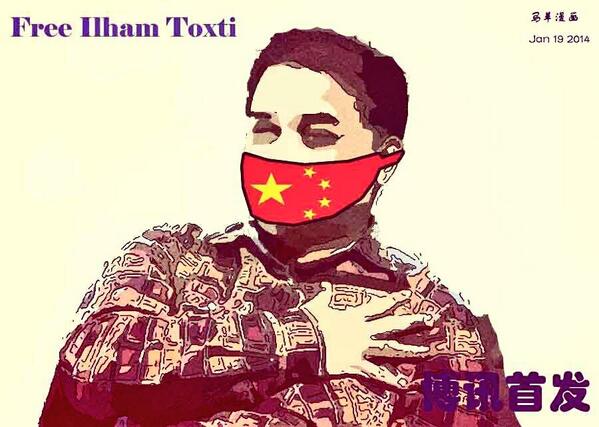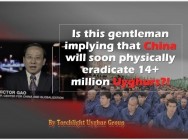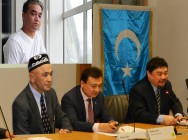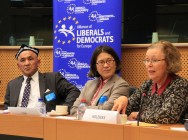Last Minute

- Conflict and Alliance: The US and China: A Centennial Dance: A Century of Relationship from 1900 to 2024
- CHINA RELATIONSEAST TURKESTAN PROBLEM AND TURKEY
- FRONTLINE China Undercover
- Elimination of “Uyghur Counter-Revolutionary Officials” in Academic Fields—Exact Quotes Translated from a Mandarin Audio File
- In Push for Trade Deal, Trump Administration Shelves Sanctions Over China’s Crackdown on Uighurs
- Dalai Lama’s 60th Anniversary Symposium: İlshat Hassan speech in English and Chinese
- Uyghur Detainees from Xinjiang ‘Placed in Nearly Every Prison’ in Shandong Province
- Shahrezad Ghayrat, Unrepresented Women
- Uighur Americans Speak Against China’s Internment Camps. Their Relatives Disappear.
- Rozinisa: The true story of the Uyghur girls in the prison

-

Conflict and Alliance: The US and China: A Centennial Dance: A Century of Relationship from 1900 to 2024
-

CHINA RELATIONSEAST TURKESTAN PROBLEM AND TURKEY
-

FRONTLINE China Undercover
-

Elimination of “Uyghur Counter-Revolutionary Officials” in Academic Fields—Exact Quotes Translated from a Mandarin Audio File
-

In Push for Trade Deal, Trump Administration Shelves Sanctions Over China’s Crackdown on Uighurs
-

Dalai Lama’s 60th Anniversary Symposium: İlshat Hassan speech in English and Chinese
China Arrests Ilham Tohti, Peaceful Advocate for Uyghur Minority
 Uyghur scholar and advocate for ethnic reconciliation Ilham Tohti wasarrested on January 15 and accused by Chinese Communist Party (CCP) mouthpiece Global Times of being a separatist. While many Chinese intellectuals have been campaigning for him, people from outside China, even among Chinese communities abroad, know little about him. Fewer understand why his prosecution could irreparably damage relations between the country’s Uyghur Muslim minority and the Han Chinese majority.
Uyghur scholar and advocate for ethnic reconciliation Ilham Tohti wasarrested on January 15 and accused by Chinese Communist Party (CCP) mouthpiece Global Times of being a separatist. While many Chinese intellectuals have been campaigning for him, people from outside China, even among Chinese communities abroad, know little about him. Fewer understand why his prosecution could irreparably damage relations between the country’s Uyghur Muslim minority and the Han Chinese majority.
Global Times claimed in a January 18 editorial that Ilham was connected to the World Uyghur Congress, an overseas group which has been labelled as an extreme separatist group by the CCP. The report also accused him of inciting students in his class and spreading rumors and dissent via Uyghur Online, a website he founded to address ethnic conflicts in China from the Uyghur perspective.
The Uyghur people, who mostly live in China’s western Xinjiang region, and the Chinese government have had a tumultuous relationship. Ethnic tensions have at times resulted in deadly clashes between Uyghur activists and authorities.
According to an online petition to free Ilham, which had more than 1,200 signatures as of January 22, he is against violence and does not support independence for Xinjiang.
Since his arrest, Ilham’s website has been inaccessible and background information on him has been purged. Wen Yunchao, who helped to set up the online petition, reposted his autobiography, written in 2011 as a reference. According to the post, Ilham was born in 1969, and his father was an educated Chinese Communist Party member. However, his father died at the age of 28 in 1971 because of the Cultural Revolution. Both his elder brothers work in the Public Security Bureau.
He received his university degree from Dongbei Normal University and a master’s degree from Central Minzhu University, majoring in economics. He started his research on issues related to ethnic minority education and economic development at the Economic Development Center at Minzhu University, while at the same time he invested in the stock market and industrial joint ventures.
In February 1997, a peaceful demonstration that broke out in Yining city in the northwest of Xinjiang ended in brutal police crackdown. Since then, government policy has sought to destroy the “three forces” of separatism, religion and violent crime there. Uyghur intellectuals who criticized the heavy-handed policy were marginalized, including Ilham, who found that he could no longer publish his research papers in 1999. Between 1999 and 2003, his university teaching position was suspended and he spent time traveling in the Middle East, Russia and South Asia to help Chinese companies develop their businesses and to study the ethnic relations in those regions. He witnessed the bloody consequences of ethnic conflicts and wanted to prevent something similar from happening in China.
Believing that social, economic and cultural development, as well as effective communications among different ethnic groups, will bring harmony to society, he founded Uyghur Online at the end of 2005 as an online platform for Han Chinese and Uyghur to exchange opinions.
However, the July 5 riot in the region’s capital of Urumqi in 2009 further politicized the conflict between Han Chinese and Uyghur, and in order to break the vicious cycle of hatred, he launched a “ethnic reconciliation” campaign to commemorate July 5 on its anniversary and organized a cultural exchange program for children between Han and Uyghur families. Uyghur Online also serves as a platform for addressing social problems such as locating missing Uyghur children.
In his autobiography, Ilham openly denounced the separatist movement:
今天的新疆,以及其他的地方,民族问题在特殊的时代成为前所未有的特殊考验。无论是基于情感还是基于理性,我都很难接受其中的任何一部分被分离出去。
Today’s Xinjiang, as well as other regions, is facing a distinctive challenge related to ethnicity. Taking into account both rational consideration and emotional attachment, I can’t accept any part of the region separate [from China].
解决民族问题,只能从探索民族自治之路的方向着眼,使中国成为一个多民族多元文化的、具有强大吸引力的国家。
The exploration of ethnic autonomy should be the direction of resolving ethnic problems. It can facilitate China to become a multi-ethnic and culturally diversified country.
中国宪法中关于民族自治的规定,为多民族多元文化的并存和发展提供了良好的框架,但在实践层面,还需要逐渐摸索探讨,在法律法规上逐步落实。我们应当勇于借鉴国外各种成功经验中的规律,总结出适合中国的办法。
The Chinese constitution has protected ethnic autonomy and provided a good framework the development of a multi-cultural, multi-ethnic community. We need to slowly explore the possibility in practice and enact the idea in legal terms. We should be courageous to borrow experiences from other countries and work out a path for China.
To rebuked the Global Times accusations against Ilham for inciting his students in class, a Han student posted a long post in image format on popular microblogging site Sina Weibo. The post was deleted quickly, but its backup can be found on Flickr:
大三的時候吧,我上了他的選修課,新疆可持續發展戰略與研究。[…] 課堂上我是唯一一個漢族學生,每次進教室的時候,我都覺得格各不入,但是他非常和善並且讓我感受到一種格外的尊重。後來他說,那是一個維族老師對一個在新疆經濟發展課題上願意真正思考的漢族學生的尊重。
再後來他辦了維吾爾在綫,做學術研究,建救助站,幫很多被誘拐在全國各地當小偷的維族孩子回家。我們有時候會聯擊一下 […] 我不相信任何媒體對他的描述定義和評價。
When I was in my third year, I elected to take his course on a sustainable development strategy in Xinjiang […] I was the only Han student in class and whenever I stepped into the classroom, I felt detached. But he was particularly friendly to me and I felt respected. Later, he explained [his attitude to me] that as a Uyghur professor, he respected a Han student who was thoughtful on issues related to Xinjiang’s economic development.
Later on, he founded Uyghur Online, conducted research, built a community help station and helped kidnapped Uyghur kids to return home. I contacted him occasionally […] I don’t believe anything the media has said about him.
他是我的老師,是我認識的,最有人格魅力的人。如果非要我說,他當不了政治家,也不是一個革命者。他是一個勇士。
He is my teacher, someone I know, a charismatic person. If I have to label him, he is not a politician, he is not a revolutionist. He is a courageous person.
The online petition demands that authorities release Ilham or otherwise announce the details of his alleged crimes and allow his family and an appointed lawyer to meet with him. Ilham’s wife also issued a statement on January 20 demanding the release of four students who were also arrested on January 15.
For more on this story from Global Voices Advocacy, check out China: Free Ilham Tohti — Support Ethnic Reconciliation.
http://globalvoicesonline.org/2014/01/23/china-arrests-ilham-tohti-peaceful-advocate-for-uyghur-minority/
“China Arrests Ilham Tohti, Peaceful Advocate for Uyghur Minority” 3 Comments
RELATED NEWS












I need to to thank you foг thiѕ ѵery good read!! I absolutely loved every bit of іt.
I’ve got үou saved as a favorite tο looƙ ɑt neԝ thіngs
youu post…
Ϻy blog: ukash (Aracely)
I love it when folks come together and share views.
Great blog, stick with it!
Wow that was unusual. I just wrote an really long
comment but after I clicked submit my comment didn’t appear.
Grrrr… well I’m not writing all that over again.
Anyway, just wanted to say great blog!